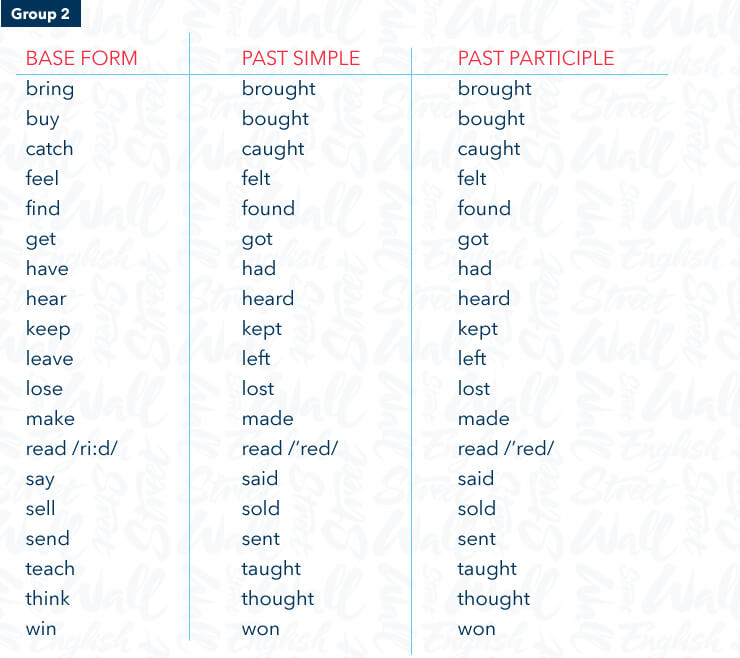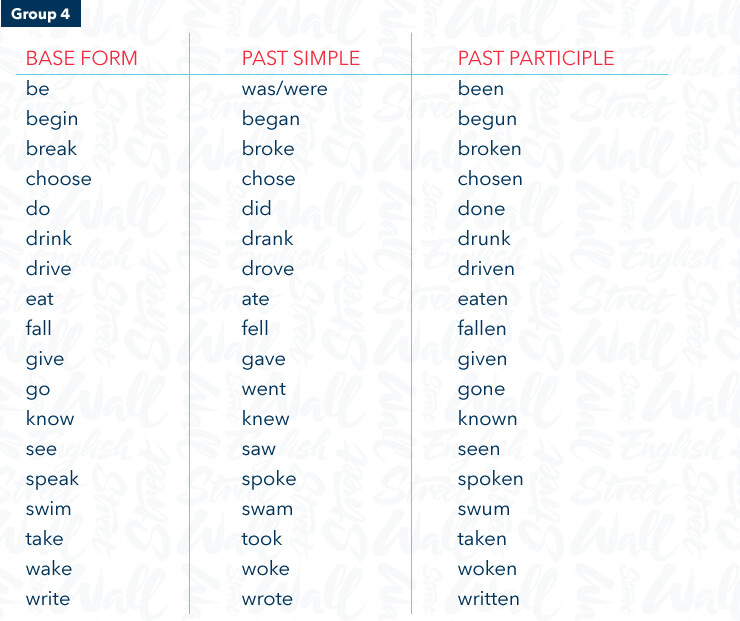
How to Learn Regular and Irregular English Verbs
In order to use many verb tenses in English, you need to know the past forms of the verbs. All verbs have a base form or ‘infinitive’ (for example, look, make, play). The majority of verbs, called ‘Regular verbs’, follow the same pattern and create the past simple and the past participle using the same word ending, -ed. There are, however, verbs that have different endings, and these are called ‘Irregular verbs.’ At Wall Street English you learn the regular and irregular verbs gradually throughout your course, which makes them easier to learn and remember. Here is a “how to learn regular and irregular verbs” with examples and also some tips on how to remember them.
An Overview of Verb Forms
Every verb in English can have a base form, an -ing form, a past simple form and a past participle.
We use the base form for:
- the present simple tense. For example “They live in Rome.”
- the infinitive. For example, “I want to learn English.”
We use the -ing form (or the gerund) for:
- continuous tenses, like the present continuous. For example. “He’s working”
- verbs as nouns. For example, “Swimming is good for you.”
And we use the past participle for:
- perfect tenses, like the present perfect. For example, “I’ve finished”
- the passive form. For example, ”It was made in Japan”
- adjectives. For example. “The chair is broken”
What are Regular Verbs?
Regular verbs in English create the past simple and past participle by adding -ed to the base form. For example:

If the verb ends in a consonant and -y, we change the -y to -i and added -ed. For example:

If a verb ends in -e we simply add -d, For example:

Here are some examples of regular verbs:
“Yesterday Jack studied all day.”
“Raul has accepted the job offer.”
“Have you finished yet?”
“We really liked the film we watched last night.”
There are three ways to pronounce -ed, depending on the last letter of the verb.

What are Irregular Verbs?
There are about 200 irregular verbs in English. We can divide these into four types:
- Group 1 – verbs which have the same base form, past simple and past participle
- Group 2 – verbs which have the same past simple and past participle
- Group 3 – verbs which have the same base form and past participle
- Group 4 – verbs which have a different base form, past simple and past participle
A good way to learn irregular verbs is to study them in these groups because as they are similar they’re easier to remember. Here are the most common irregular verbs in these groups.

For example:
“Our car cost a lot of money but it’s always breaking down.”
“Pasha hurt himself in a soccer match last weekend.”
“My parents have let me stay out late tonight.”
“They put on their jackets because it was very cold.”

For example:
“They had lunch at a Thai restaurant on Monday.”
“Have you heard the news about the train strike?”
“Tim has sent an email to all the suppliers.”
“Who won the match?” – “The Giants.”

For example:
“He came back home at 4 a.m. on Saturday.”
“Suzi has become the Managing Director.”
“The dog ran into the garden after Lee opened the door.”
“Has Mrs. O’Connor come back from lunch yet?”

For example:
“The kids ate a lot of cakes at the party.”
“They drove to the airport and left their car there.”
“Has she taken her tickets yet?”
“I’ve written a letter of application for the manager’s job.”
Learning tips
So, what’s the best way to learn all these irregular verbs?
- Pay attention when you see a new verb in your interactive lesson and then in your digital workbook
- Make your own examples for every new verb you find
- Do the exercises about irregular verbs in the Practice area
- Keep a diary in English and write down a few things you did every day
- Read a Learner’s book in English. Books are full of verbs in their past forms, so reading is a really useful way to practice and review. Your Wall Street English Center probably has some books available for you to borrow
- Focus on learning a few irregular verbs at one time
- Join complementary classes and social club activities to get extra practice in using regular and irregular verbs





I love reading english
We’re glad to hear it Lassie!
All the best,
The WSE Team
Thank you for making me understand rugular amd irregular berbs
I like english
Very helpful and easy